Headlines
Tinubu Definitely Graduated From Chicago State University – Farooq Kperogi
I’m no fan of President Bola Ahmed Tinubu. Anyone who has followed my writing in the last few years will attest that I rank in the top three severest critics of his person, record, and politics.
But I’d be remiss in my self-imposed lifetime commitment to pursue the truth irrespective of where it leads me and expose falsehood irrespective of the consequences if I ignore the renewed, systematic dissemination of easily refutable lies about Tinubu not having graduated from Chicago State University (CSU).
Tinubu undeniably has many skeletons in his closet, but Chicago State University isn’t one of them. There is no question that the man who is known today as President Bola Ahmed Tinubu attended CSU for two years and graduated from it in 1979.
His study at CSU—a four-year, state-funded, historically Black university—was shortened because he transferred two years’ worth of college credit from Richard J. Daley College, a community college (equivalent to a diploma-awarding institution in Nigeria) in Chicago, which started life as William J. Bogan Junior College in 1960, got renamed Southwest College in 1970, and got renamed yet again as Richard J. Daley College in 1976.
That Tinubu graduated from CSU has never been in dispute. It was his claim to have attended or graduated from the elite, highly-ranked, privately owned University of Chicago that was a lie, but he later took back this claim and blamed it on an unintentional error by Senator Tokunbo Afikuyomi.
In June 2022, when fresh, widely shared, and obviously politically inspired doubts were raised about the authenticity of Tinubu’s graduation from CSU, I took advantage of my being a professor here in the US and reached out to friends and colleagues at the school to help me verify this information.
A friend, who is a professor of English at the university, went to the registrar’s office and confirmed that Tinubu indeed attended and graduated from CSU. “Please be advised that Bola A Tinubu attended Chicago State University from August 1977 [to] June 1979. He was awarded a Bachelor of Science degree in Business Administration with Honors on June 22, 1979. His major was accounting,” a statement from the office of the Registrar of the university read.
I shared this finding in a June 27, 2022, article titled “A Bola Tinubu Graduated From Chicago State University,” which several news outlets and blogs picked up. I wrote that “A Bola A. Tinubu” had graduated from CSU because I hadn’t conclusively authenticated the identity of the person and didn’t want to make any evidence-free association of the name with then presidential candidate Bola Ahmed Tinubu.
But as I pointed out in a later column titled “Lies and Truth About Obi, Atiku, and Tinubu,” I can now confidently establish that the Bola A. Tinubu who graduated from CSU in 1979 is the same Bola A. Tinubu who is president of Nigeria today. I know this because the yearbook photo of the 1979 CSU cohort features the headshot of an unmistakably younger Tinubu, even though his last name was misspelled as “THUBV.” I’ll come back to this point shortly.
In the past few days, a seemingly coordinated misinformation campaign has been relaunched to resuscitate the lie that Tinubu didn’t graduate from CSU. The rehabilitation of the lie is being constructed on a hexad of appealing but ultimately self-contradictory inaccuracies and innuendos.
The first is that a search of Bola A. Tinubu in the archive of US college graduation records yields zero matches. Well, that’s because Tinubu’s last name was misspelled as “THUBV” in his final graduation record. But a search of “Bola A. THUBV” (which one Engr. Stanley with the Twitter handle @Engr_Stanley_EC did) turns up the record of a male who graduated from CSU with a degree in Business Administration (and a concentration in accounting).
Non-Western names are always liable to be misspelled here. I know because I’ve suffered this multiple times. Apparently, Tinubu wrote his name in long hand, as was the practice then, and whoever was responsible for entering the final records couldn’t correctly make out Tinubu’s handwriting. It’s easy to see how handwritten “I” and “N” can be mistaken for “H” and how “U” can be mistaken for “V.”
Of course, it’s reasonable to assume that Tinubu complained, and a correction was later issued for his degree certificate, but it was too late for the information that was sent to the National Student Clearinghouse.
The second trigger for the rehabilitation of the lie is a putative July 8, 2011, FBI letter to the EFCC, which allegedly concluded that its search of Bola “Tinubo” in Chicago State University’ records showed that no such person ever enrolled at the school.
Well, duh (as Americans would say to signal that something is self-evidently obvious), no “Bola Tinubo” exists anywhere in the world. Had the FBI searched for “Bola A. Tinubu” at CSU’s registrar’s office, it would have found out that a person with that name graduated from the school in 1979.
The third lifeline for the revival of the falsehood is that a transcript oddly dated “0/76” from Southwest College belonged to a female. As I pointed out earlier, Richard J. Daley College used to be called Southwest College until late 1976. So, when Tinubu first enrolled at the school in 1975, it was called Southwest College, but by the time he graduated from it in 1977, it had been renamed Richard J. Daley College.
There are several red flags with the transcript, the boldest being the numbering scheme of the social security number shown in it. The nine-digit U.S. social security number is divided into a three-digit area number, a two-digit group number, and a four-digit serial number. It has always been that way.
But the social security number in the Southwest College transcript supposedly belonging to a female Bola A Tinubu is 231-060-595. That’s an impossible numbering scheme for a US social security number. Plus, the transcript isn’t properly dated and leaves the spaces for date of birth and record of high school blank. These are no trivial red flags of inauthenticity.
The fourth reason some people have infused a new life to the lie that Tinubu didn’t graduate from CSU is that the university locked its Twitter account in response to unremittingly vitriolic denunciations from some Nigerians. They say that indicates that the school is guilty of issuing a fake degree to Tinubu. That’s tortured logic. People and organizations routinely lock their Twitter accounts when they are subjected to an unceasing torrent of caustic online abuse.
In April, a TIME magazine reporter by the name of Astha Rajvanshi who wrote a profile on Tinubu after he made it to the magazine’s 100 most influential people in the world was forced to lock her Twitter account after political fanatics relentlessly cursed, defamed, and threatened her for doing her job.
CSU is obviously unaccustomed to the quantum of negative attention it’s receiving from a group of Nigerians who are still smarting from the outcome of the last presidential election. It obviously wants to stop it.
The fifth impetus for the revival of the lie that Tinubu couldn’t have graduated from CSU is that Tinubu withdrew claims that he attended primary and secondary schools in Nigeria, which means he didn’t possess qualifications to be admitted to a US higher education institution.
Well, it’s entirely possible to earn a degree in America without ever attending a secondary school. There’s something called the General Educational Development test (or GED) for people who didn’t earn a high diploma before the age of 18. A close American friend and colleague of mine by the name Dr. Matt Duffy didn’t have a high school diploma. He had a GED, but he ended up getting a Ph.D.
I am not saying that was what happened with Tinubu. I don’t have the facts to make that claim. But it’s reasonable to assume that since it’s widely speculated that Tinubu changed the identity he had at birth, he disclaimed all associations with the schools he attended in his actual hometown in Osun and took a GED test in Chicago. In any case, most community colleges (and non-flagship state schools) have open enrollment policies, which means just about anybody can get into them.
Finally, the fact that Tinubu doesn’t want CSU to release his academic record— and the fact that the university has spurned requests to release his records— is being held up as an indication that he had no academic record there and that Tinubu and CSU are acting in cahoots to cover up a crime.
Well, there’s something called the Family Educational Rights and Privacy Act (FERPA), which forbids all universities and colleges in the United States from disclosing the academic records of a student to a third party. Every year, I (and all university employees who handle students’ grades here) have to undergo training on how not to disclose students’ records to third parties, including to parents, without students’ written permission.
Schools can only confirm directory information such as whether or not a student graduated from a school, which CSU has done repeatedly. And why would Tinubu accede in writing to his academic records being released to political opponents? Most people won’t, even if it’s just for the pleasure of seeing their opponents squirm in anger and frustration.
Farooq Kperogi is a renowned Nigerian newspaper columnist and United States-based Professor of Journalism.
The post Tinubu Definitely Graduated From Chicago State University – Farooq Kperogi appeared first on Jomog.
Education
1ST NIGERIAN TERTIARY INSTITUTIONS CONFERENCE ON UN SUSTAINABLE DEVELOPMENT GOALS (SDGS) ESSAY COMPETITION
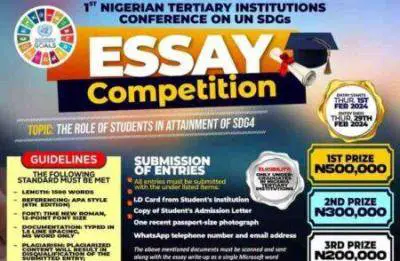
Competition Overview:
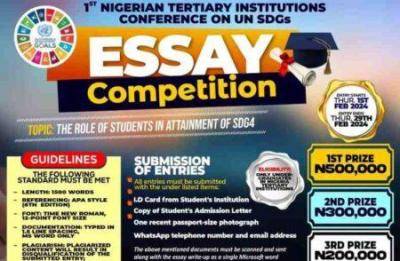
The SDG Youth Essay Competition offers a grand prize of N1 million for the top three winners, along with free sponsorship to attend the 1st Nigeria Tertiary Institution Conference on Sustainable Development Goals (SDGs) in April 2024 in Abuja.
Competition Requirements:
1. Eligibility:
– Open exclusively to undergraduates in Nigerian tertiary institutions.
2. Entry Guidelines:
– Topic:The Role of Students in Attainment of SDG4
– length: Essays should be 1500 words.
– Entry Period: Thursday, February 1, 2024 – Thursday, February 29, 2024
– Referencing: APA Style (6th Edition).
– Font: Times New Roman, 12-point font size.
– Documentation: Typed in 1.5 line spacing, MS Word format only.
– Plagiarism: Only original content is accepted; plagiarized entries will be disqualified.
Benefits:
– Prizes:
– 1st Prize: N500,000
– 2nd Prize: N300,000
– 3rd Prize: N200,000
– Winners will also receive free sponsorship to attend the 1st Nigeria Tertiary Institution Conference on Sustainable Development Goals (SDGs) in April 2024 in Abuja.
Required Documents:
– Student’s Institution ID Card
– Copy of Student’s Admission Letter
– One recent passport-size photograph
– WhatsApp telephone number and email address
Application Procedure:
– All entries and submissions (essay and required documents) should be scanned and sent to nigeriaessay@sdgyouth.org before the deadline.
For Further Inquiries:
– Call: 08068931151, 08133846739, 07067772964
– Email: nigeriaessay@sdgyouth.org
Deadline: February 29th, 2024
Don’t miss this opportunity to contribute to achieving SDG4 and win exciting prizes. Submit your entry and required documents before the deadline. For any inquiries, feel free to contact them via phone or email.
Education
PENTAGON PARTNERS NATIONAL ESSAY COMPETITION FOR UNDERGRADUATE LAW STUDENTS
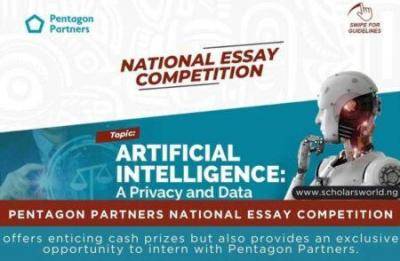
Competition Overview:
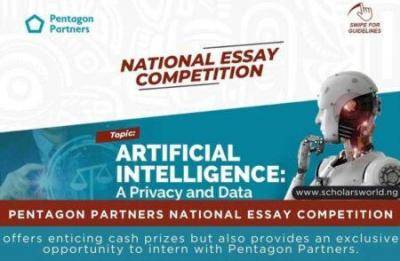
The National Essay Competition invites undergraduate law students to showcase their expertise and contribute to the discourse on AI, privacy, and data protection. In addition to cash prizes, participants have the chance to intern with Pentagon Partners, gaining valuable hands-on experience.
Competition Requirements:
1. Eligibility:
– The competition is open to 400-level and 500-level undergraduate law students in Nigerian universities.
2. Essay Requirements:
– Length: Essays should not exceed 1500 words.
– Format: Double spaced, 12pt Times New Roman font.
– References: OSCOLA format for citations with 10pt font size for footnotes and endnotes.
– Submission Format: Essays must be submitted in PDF format.
– Entrant Details: Include full names, school, level, phone number, and email address in both the body of the email and on the last page of the essay.
– Single Entry: Each entrant is allowed only one submission.
– Originality: Plagiarism will result in automatic disqualification.
Competition Benefits and Timeline:
1. Prizes:
– Winner: N200,000
– 1st Runner Up: N150,000
– 2nd Runner Up: N100,000
2. Internship Opportunity:
– In addition to cash prizes, winners have the exclusive opportunity to intern with Pentagon Partners, enhancing their career prospects.
Application Procedure:
– Interested participants should submit their essays to essay@pentagonpartnerslp.com during the submission period.
– The subject of the email should be the Essay topic
For additional information and updates, visit www.pentagonpartnerslp.com.
Deadline: March 22nd, 2024
Don’t miss this chance to showcase your legal expertise, contribute to important discussions on AI and law, and vie for enticing cash prizes. Pentagon Partners looks forward to receiving your submissions.
Education
SYSTEMSPECS CHILDREN’S DAY ESSAY COMPETITION (CDEC), 2024

Purpose:
Inaugurated in 2020, the CDEC is part of SystemSpecs’ Corporate Social Responsibility (CSR) commitment to promoting capacity development in the Nigerian ICT industry. By encouraging young Nigerians to tackle everyday issues, the competition contributes to intellectual growth and societal progress.
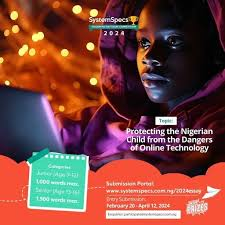
Topic:
The theme for the 2024 competition is “Protecting the Nigerian Child from the Dangers of Online Technology.” Participants are tasked with exploring strategies to safeguard children in an increasingly digital world.
Eligibility:
– Open to primary and secondary school students in Nigeria aged 9 to 16.
– Junior category (ages 9 to 12) essays must not exceed 1,000 words.
– Senior category (ages 13 to 16) essays must not exceed 1,500 words.
Prizes:
– Winners will receive generous rewards, including a high-capacity laptop, premium headphones, a portable laptop stand, a smart wristwatch, and one year of internet data, among other items.
– Consolation prizes will be awarded to other participants.
Application Process:
– Interested candidates should access the application page
– Essays must be written in English and reflect original thought.
– Each participant is limited to one entry.
– Entries must be endorsed by an accredited school official, parent, or legal guardian.
– Deadline for submissions is April 12, 2024.
Submission Guidelines:
– All submissions must be in PDF format and include the student’s name, home and school addresses, email address, and contact phone number.
– Double entries will result in automatic disqualification.
– Submissions must be received by March 15, 2024, at 5:00 p.m.
Notification of Winners:
– Successful students and schools will be contacted in the second quarter of the year.
– Updates on winners will be announced on @nercng social media platforms.
The SystemSpecs Children’s Day Essay Competition offers a unique opportunity for Nigerian students to demonstrate their creativity and problem-solving skills. By addressing the theme of online child protection, participants contribute to building a safer and more secure digital environment for all. We encourage eligible students to seize this opportunity and showcase their talent and ingenuity.
-

 Education7 months ago
Education7 months agoSYSTEMSPECS CHILDREN’S DAY ESSAY COMPETITION (CDEC), 2024
-

 News2 years ago
News2 years agoFull Text of President Bola Tinubu’s Inauguration Speech on May 29, 2023
-

 CELEBRITY NEWS2 years ago
CELEBRITY NEWS2 years ago“E no balance”-Netizens react as Bobrisky shows off new shape days after surgery
-

 entertainment10 months ago
entertainment10 months agoAuthorities Arrest Six in Connection with Murder of South African Rapper AKA [VIDEO]
-
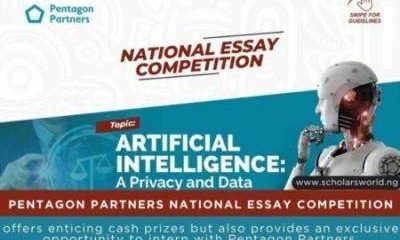
 Education7 months ago
Education7 months agoPENTAGON PARTNERS NATIONAL ESSAY COMPETITION FOR UNDERGRADUATE LAW STUDENTS
-
Headlines2 years ago
FULL TEXT: Tinubu Addresses 78th UN General Assembly
-
Headlines2 years ago
Full Text Of President Bola Tinubu’s Address To Nigerians On Socio-economic Challenges
-
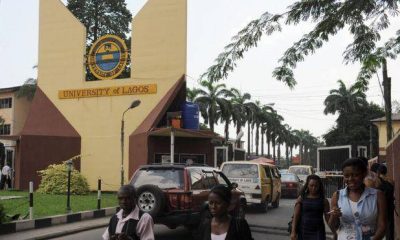
 Education8 months ago
Education8 months agoUNIVERSITY OF LAGOS (UNILAG) ANNOUNCE SALES OF SANDWICH ADMISSION FORM
